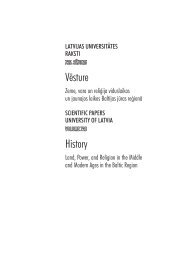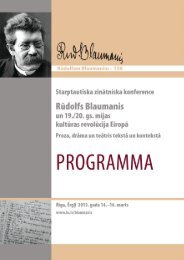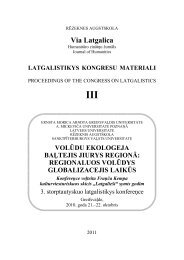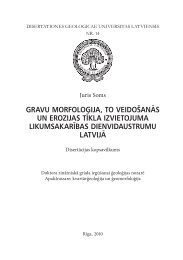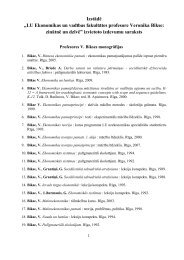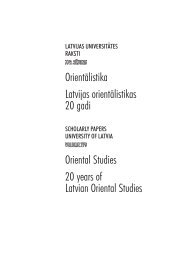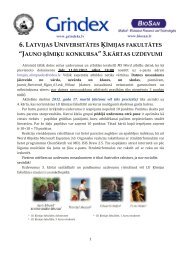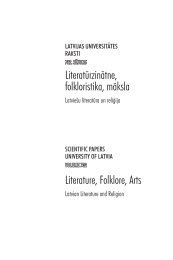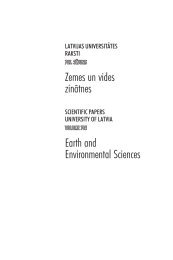Untitled
Untitled
Untitled
You also want an ePaper? Increase the reach of your titles
YUMPU automatically turns print PDFs into web optimized ePapers that Google loves.
Kaspars Eihmanis. Pârdomas par starpkultûru hermeneitikas metodoloìiju<br />
275<br />
conceptions of precise scientific discourse. On the other side, Chinese blaming the<br />
West (I must excuse myself for still using such empty and ambivalent notions as<br />
Orient, East, Occident and West) for an attempting to persuade them to become the<br />
believers of the Western universalism, still find themselves trapped in Marxist theories<br />
of history of philosophy, being mostly Western by origin. The never–ending accusations<br />
of the misuse of unkindred and unfitting concepts on the one side and the<br />
persistent strife to give a universal validity to its tradition, without becoming the part<br />
of a more universal universalism, on the other side, will still dominate the hermeneutical<br />
understanding of different cultures.<br />
Ram Adhar Mall, who has elaborated on the concept of intercultural philosophy,<br />
has defined it more precisely: “Europeanization stands for the software of Western<br />
culture and religion, whereas westernization represents its hardware.” 4 Europeanization<br />
is still being perceived as centred in itself, claiming universalised insights of<br />
understanding human history and the human agent’s place in it. Both philosophers<br />
belonging to different traditions, namely Chinese and Indian traditions, both seem to<br />
agree that the modern science is neutral in its universalistic claims, whereas Western<br />
philosophy and religion has remained deeply entranched with eurocentrist prejudices.<br />
Although both strive to show that philosophy should be placed in the same category<br />
as science, since no one should claim the absolute possession of it. Cheng Chung–<br />
ying defines philosophy as follows:<br />
“Philosophy is the core of a tradition because it is both a mode of thinking and<br />
a normative direction of action towards ideal values of the tradition. Philosophy is<br />
both the consciousness and the conscience of a culture and civilisation because<br />
philosophical views, formulated by recognised philosophers and accepted by common<br />
people over ages, inspire and guide culture and action.” 5 Cheng Chung–ying<br />
has obviously chosen to lay stress on the connection between the tradition and<br />
philosophy being its core, not considering the breaking–with–the–tradition character<br />
of many philosophical ideas and philosophical currents. In the post–modern period,<br />
which has seen too many radical iconoclasts of the tradition of Western philosophy,<br />
no one still dares to pronounce the philosophy as being homogenic. Such a definition<br />
might be applied to the Chinese tradition, which has always tended towards<br />
universism of its concepts and homogenic character of the tradition embodied by<br />
them. It can not serve as a suitable definition. And are there any for all purposes?<br />
Ram Adhar Mall, whose ideas on intercultural philosophy we discuss in the following<br />
passages, on the other hand feels the necessity to defend the universal application<br />
of the term philosophy, arriving at the conception of interculturality: “The general<br />
concept of philosophy possesses a universal connotation over and above its<br />
particular, adjectival qualifications, such as Chinese, Indian, European, and so on.<br />
This connotation gives us the right to speak of interculturality.” 6 The attempt to<br />
generalise the term philosophy to the extent where it acquires the universal connotation<br />
seems futile, since the most universal concept is the most emptiest one, though<br />
the author writes that, “Intercultural philosophy does not deny the universal connotation<br />
of the term philosophy; it only makes clear that its general applicability is not<br />
a concrete universal but is on the line of the Wittgensteinian idea of a world language<br />
that is not the name of a particular language but the name of the class of all<br />
language games.” 7



